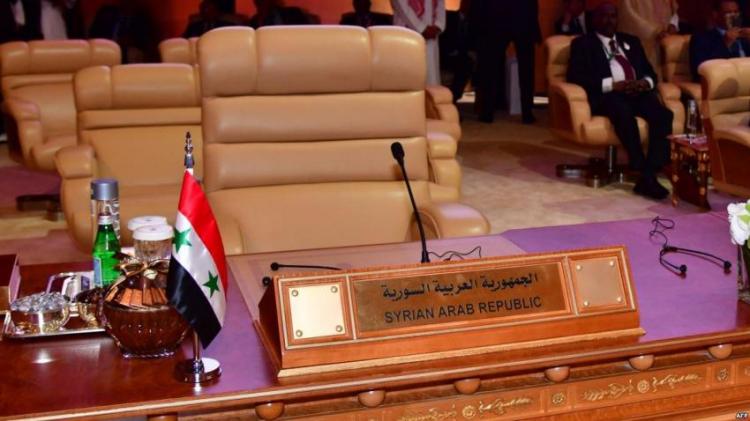QAMISHLI, Syria (North Press) – The decision to readmit Syria to the Arab League, following 12 years of pariah, has been met with different stances, praising or criticizing, regionally and internationally.
On Sunday, Arab’s foreign ministers agreed at a closed meeting at the Arab League’s headquarters in Cairo, Egypt, on Syria’s official return to its seat in the Arab League after 12 years of suspension.
Syria’s Ministry of Foreign Affairs and Expatriates said in a statement published by the state-run SANA News Agency, “Syria has received with interest the decision” issued by the Arab League’s Council regarding the resumption of the participation of delegations of the Syrian government in the council’s meetings.
“Syria stresses, in the same context, the importance of dialogue and joint action to confront the challenges facing Arab countries,” the Ministry added.
Syria’s key allies – Iran and Russia – praised the step to return Syria to its seat that immediately followed a visit paid by Iran’s President Ebrahim Raisi to Syria on May 3, the first since 2011.
Spokesman of the Iranian Minister of Foreign Affairs, Nasser Kanaani, said on Monday the decision by the Arab states brings about positive outcomes and prepares the ground for preventing foreign interference in the region.
Iranian media praised the return as a “resistance reward,” a move that comes right after Raisi’s visit to Damascus, which nearly is seen as “a seal of approval for Iran’s role in Syria,” according to the Jerusalem Post.
As for Russia, it was also pleased by the decision that can contribute to help it, as a mediator, to thawing ties between Syria and Turkey.
Spokesperson for Russia’s Foreign Ministry Maria Zakharova said in a statement, “Moscow welcomes this long-awaited step, the logical result of the process, which has gained momentum, of returning Syria to the ‘Arab family.’”
Zakharova added that this step reveals “the Arab countries’ aspiration to bolster co-ordination of actions in the interests of settling pertinent regional and international issues.”
The UAE expressed on Sunday its support for the decision, describing it as a “positive step.”
Anwar bin Muhammad Gargash, Diplomatic Advisor to the UAE President, said in a tweet, “Syria’s return to the Arab League is a positive step that reactivates the Arab role in this vital file.”
Lebanese Parliament Speaker Nabih Berri lauded the Arab League’s decision to return Syria to its Arab family after all these years of shunning.
“This decision was delayed for years, but it is a step in the right direction towards a return to Arab righteousness,” Berri said.
He stressed that Syria’s return represents “a glimmer of hope for a new resurrection of joint Arab action.”
Qatar, the key broker for the Syrian opposition against the Syrian government, did not attend the session, during which the decision was taken.
Qatar stressed on Sunday, “Normalizing relations with the Syrian regime has not changed.”
The US, for its part, stressed its rejection for such a step, saying it is “skeptical of Assad’s willingness to take the steps necessary to resolve Syria’s crisis,” a State Department Spokesperson told Reuters, adding that the US would not drop its sanctions.
Arab League Secretary-General Ahmed Aboul Gheit said during a press conference in Cairo on Sunday, “The reinstatement of Syria does not mean normalization of relations between Arab countries and Syria…This is a sovereign decision for each country to make.”
A report publicized by the Times of Israel sees the decision as a “positive step” towards peace in the Middle East, noting that the Arab bloc is disclosing its intention to resolve the Syrian conflict, especially with the ongoing violence and instability the region is going through.
The report also highlighted the role of external actors, Russia, Iran, and Turkey, in the conflict that has complicated efforts to solve the Syrian crisis.
The Jerusalem Post, in a report, said that the Syria’s return to the Arab bloc is a “symbolic turning point bookending the Arab Spring and part of a new diplomatic era in the region, with the potential to hand over a win to Iran and Russia.”
The report added that the decision can help Iran to move more weapons to Syria under it [the decision] in an attempt to provoke Israel.
Furthermore, the decision to suspend Syria’s membership in the Arab League in the first place was taken in response to the violent crackdown practiced by the Syrian government against peace protesters during the 2011 uprising against al-Assad’s rule.

